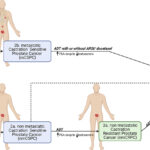Metastatic castration-resistant prostate cancer (mCRPC) is an advanced form of prostate cancer that continues to progress despite androgen deprivation therapy (ADT). A subset of mCRPC cases involve mutations in the BRCA1 or BRCA2 genes, which play a crucial role in DNA repair. These mutations impact the tumor’s response to treatment and have significant implications for therapeutic strategies.

Understanding BRCA Mutations in Prostate Cancer
The BRCA1 and BRCA2 genes are essential for maintaining genomic stability by repairing damaged DNA. Mutations in these genes increase the risk of developing several cancers, including prostate cancer. Patients with BRCA2 mutations have a higher likelihood of developing aggressive and treatment-resistant forms of the disease.
How BRCA Mutations Affect Prostate Cancer Progression
- Increased Tumor Aggressiveness: BRCA2-mutated tumors tend to be more aggressive and spread faster.
- Altered Treatment Response: Standard therapies, such as hormone therapy and chemotherapy, may be less effective.
- Potential for Targeted Therapy: Patients with BRCA mutations are candidates for PARP inhibitors and other targeted treatments.
Risk Factors for mCRPC with BRCA Mutation
Genetic and Hereditary Factors
- Family history of prostate, breast, ovarian, or pancreatic cancer.
- Inherited BRCA1/BRCA2 gene mutations.
- Ethnic background, with higher prevalence in individuals of Ashkenazi Jewish descent.
Environmental and Lifestyle Factors
- High-fat diet and obesity.
- Chronic inflammation and exposure to carcinogens.
- Older age (most cases diagnosed in men over 60).
Diagnosis and Genetic Testing
Diagnostic Tests
- PSA (Prostate-Specific Antigen) Test: Elevated levels indicate prostate cancer progression.
- Imaging Studies: CT scans, MRI, and PET scans help determine cancer spread.
- Biopsy and Histopathology: Confirms presence and aggressiveness of the tumor.
Genetic Testing for BRCA Mutations
- Recommended for patients with aggressive prostate cancer or a strong family history.
- Conducted via blood or saliva samples.
- Helps determine eligibility for targeted therapies.
Treatment Strategies for mCRPC with BRCA Mutation
Androgen Deprivation Therapy (ADT)
- First-line treatment aimed at reducing androgen levels, which fuel prostate cancer growth.
- Medications include leuprolide, goserelin, and abiraterone.
PARP Inhibitors: A Targeted Approach
Patients with BRCA mutations benefit from Poly (ADP-ribose) polymerase (PARP) inhibitors, which exploit DNA repair deficiencies in cancer cells.
FDA-Approved PARP Inhibitors
- Olaparib (Lynparza): Approved for BRCA-mutated mCRPC.
- Rucaparib (Rubraca): Used for patients with BRCA1/2 mutations who have received prior treatment.
Chemotherapy
- Docetaxel and Cabazitaxel remain standard for patients with progressive disease.
- Used in combination with PARP inhibitors or immunotherapy.
Immunotherapy
- Pembrolizumab (Keytruda) is used in patients with high microsatellite instability (MSI-H) or DNA mismatch repair deficiency (dMMR).
- Stimulates the immune system to attack cancer cells.
Radiopharmaceuticals
- Radium-223 (Xofigo): Targets bone metastases to reduce pain and prevent fractures.
- Lutetium-177 PSMA Therapy: A novel treatment targeting prostate-specific membrane antigen (PSMA).
Prognosis and Survival Rates
Patients with BRCA-mutated mCRPC often have a poorer prognosis compared to those without mutations. However, the advent of targeted therapies such as PARP inhibitors and immunotherapy has significantly improved outcomes.
Key Prognostic Factors
- Response to Hormone Therapy – Longer response correlates with better outcomes.
- Tumor Burden and Metastatic Spread – Lower tumor burden improves survival.
- Early Detection of BRCA Mutations – Allows for personalized treatment planning.
Future Directions and Research
Ongoing Clinical Trials
- Investigating new combination therapies involving PARP inhibitors, immunotherapy, and hormone therapy.
- Exploring next-generation targeted treatments for BRCA-mutated prostate cancer.
The Role of Precision Medicine
- Liquid biopsies and circulating tumor DNA (ctDNA) analysis help monitor treatment response.
- Artificial intelligence (AI) in oncology is advancing personalized treatment approaches.
Metastatic castration-resistant prostate cancer with BRCA mutations presents unique challenges but also opens new avenues for targeted therapy. Early detection, genetic testing, and novel treatment strategies are crucial in improving patient outcomes. As research advances, the integration of precision medicine and combination therapies holds promise for extending survival and enhancing quality of life.

